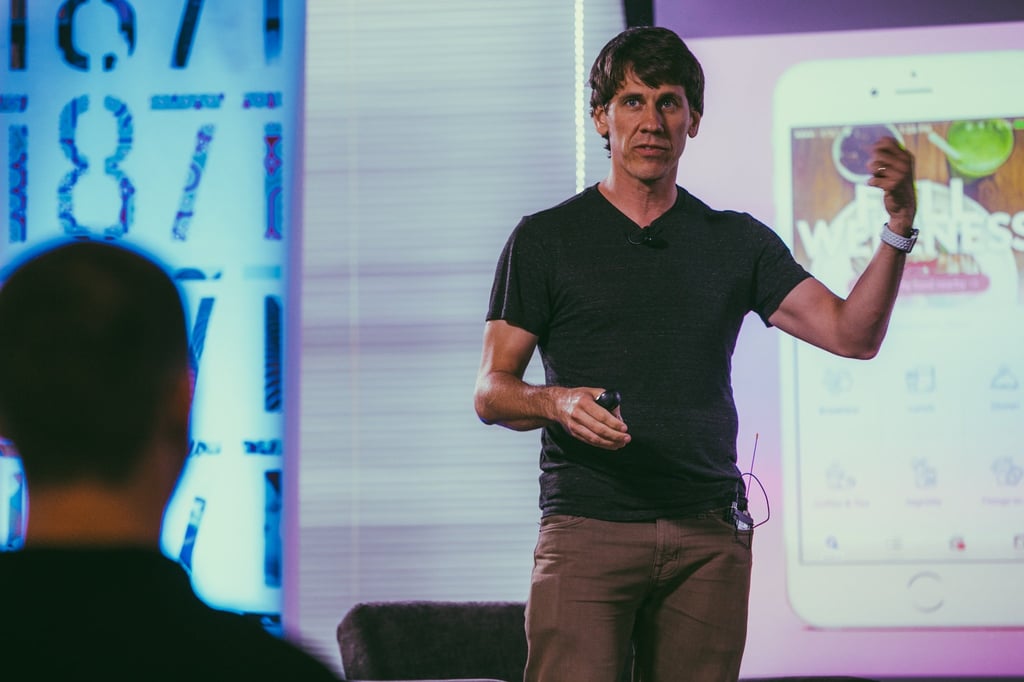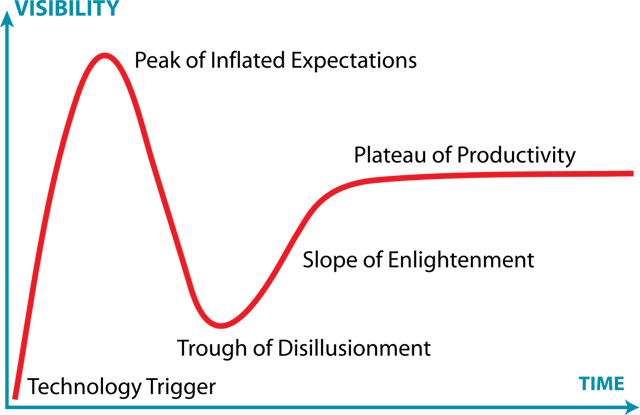Dennis Crowley’s company was built on the concept of “check-ins,” and the Foursquare founder absolutely had chances to check out during his entrepreneurial journey. But after selling his first location-based company -- Dodgeball -- to Google and watching it fold, Crowley set a vision for his business and stuck to it. For anyone who is struggling to stick it out, Crowley’s keynote on August 1 and subsequent Q&A with Kevin Willer of Chicago Ventures packed some serious wisdom.

- Beware (or at least be aware) of the roller coaster: Or, more specifically, the “Gartner Hype Cycle.” Foursquare’s progress as a company closely followed the path of growth and adoption of a technology laid out by the research and analysis company Gartner. Foursquare rode the wave of a wildly successful launch at SXSW in 2009 into the “Peak of Inflated Expectations,” where everyone from Google to Yelp was trying to copy their model, leading to what he dubbed “The Check-in Wars.” Startups that find their company in a period of hype following media attention and huge user growth should expect to spend time in each of these stages -- provided they can survive the wild ride.

"It kind of looks like bullshit until you live through it, then you’re like, this is my life” —Crowley on the Hype Cycle
- Don’t lose sight of your vision: Distractions, tempting pivots and competition all threatened Foursquare throughout its now nearly decade long business journey. But entrepreneurs should try to avoid these outside influences and stick to their original vision. For Foursquare, this meant not making “the best check-in button” but always trying to build “software that learns from places you’ve been.” Sometimes, this can mean building the technology that will make your vision possible. After the promise of effective “geofencing” that Apple was to release with iOS 5 floundered, Crowley persisted and eventually built “Pilgrim,” the tech solution that allows for -- in simple terms -- a phone to know a user’s exact location without a manual check-in.
“Holy shit, this actually works!”—Crowley on successfully reaching the “Slope of Enlightenment” on the Gartner Hype Scale, a milestone when he said the company was finally reaching its vision.
- Be prepared to build the tech that will achieve your vision: The technology that Foursquare developed to track a user’s location and turn that into insightful data was dubbed Pilgrim -- and marked a turning point for the company. Recently, Foursquare announced the release of Pilgrim SDK, which will allow app developers to tap into that location data to make their own visions a reality. What exactly will this powerful location-based data allow devs to do? Crowley envisions game creators using the data to make Pokemon GO-esque type experiences, where a user’s character might become stronger if the user spent time at the gym the previous day, or lethargic if the data shows they were out until 2 a.m. at a bar. It could lead to smarter fitness apps as well. Crowley said workout apps could tailor themselves to the choices users made in the previous day or week. A harder workout would appear for those who spent time at fast food restaurants, while an easier routine could appear for those who shopped at Whole Foods and spent more time being active.
“If you want the future to exist today, go build it.” —Crowley on the release of Pilgrim SDK
- Great data = Even greater headlines: Always remember data can tell a story. If your company has information no one else does, it can often be repurposed to reflect current pop-culture and news trends. For example, Foursquare has gotten some serious credit for being eerily good at predicting trends based on its data, and it’s gotten the company some serious headlines from TechCrunch to Mashable. Some of the notable events the Foursquare crystal ball has foreseen? A dead-on forecast of Apple iPhone sales, debunking the myth that bars are losing business in areas where marijuana is legal and showing a drop in US tourism.
- Do something crazy: Stick to your idea -- as crazy or unattainable as it may sound -- as long as you can. More than that, create a culture in your business that allows for “crazy” ideas to be explored by the entire team. Even in his personal life, he’s taken chances on opportunities and ventures that have been dismissed from the get go, including building a successful semi-pro soccer team from scratch near his home in upstate New York.
“The ideas that people think are crazy or stupid or impossible are probably your best ones. A founder should only give up when they have convinced themselves the dream is unattainable, not when someone else says it is.” —Crowley
Extra tidbits:
The personal life of a successful entrepreneur isn’t always easy, and Crowley has found ways of navigating it. For one, he stepped down as CEO to take chairmanship of the board of Foursquare, in order to avoid the day-to-day stress and focus more on his family. For entrepreneurs who happen to be married to another entrepreneur (Crowley's wife is Chelsa Crowley, Co-Founder of Stowaway Cosmetics), set boundries. The couple’s golden rule? Don’t give the other advice unless it’s asked for.
This recap of the conversation with Dennis Crowley is one in a series of insights from founders at 1871. Get a peek at who is speaking at 1871 next, and be sure to check out our previous Founders’ Five roundup with TastyTrade founder Tom Sosnoff.



